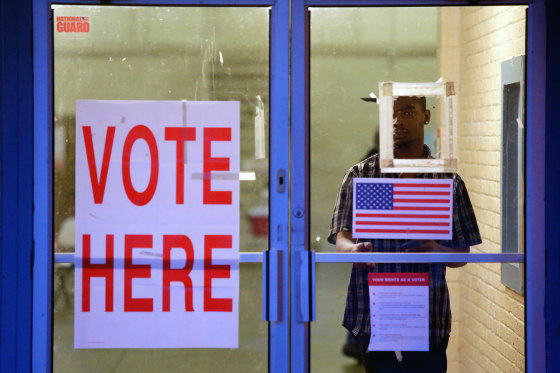
If the Supreme Court allows Alabama to continue denying Black communities fair representation, it will open the door to other states and localities that want to follow suit.

A voter exits a polling station during the presidential primary in Camden, Ala., on March 3, 2020. Joshua Lott / AFP - Getty Images file
Oct. 8, 2022, 10:00 AM UTC By Bradley E. HeardOn Tuesday, Alabama confirmed what we have long known to be true: Lawmakers there are willing to do anything in their power to deny the rights of communities of color. During oral arguments before the Supreme Court in Merrill v. Milligan, Alabama asserted that they have the authority to bypass the Voting Rights Act, a move that would give them free rein to essentially draw maps that favor white voters over voters of color.
This should be an open-and-shut case. The Black community represents almost one-third of Alabama’s population, yet the state’s congressional maps contain only one majority-Black district out of seven. State lawmakers have weaponized redistricting by redrawing congressional maps after the 2020 census to spread some Black communities across multiple districts and combine others into one district, denying Black Alabamians fair representation in government. A three-judge federal court has already deemed this effort unlawful and unanimously struck down the maps in January. But Alabama, of course, appealed to the Supreme Court.
Lawmakers there are willing to do anything in their power to deny the rights of communities of color.
In its appeal, the state launched a direct attack on Section 2 of the 1965 Voting Rights Act, the federal law protecting the right of voters of color to elect candidates that represent their communities. In its brief, Alabama audaciously attacked the three-part Gingles test, which has been used for decades to establish whether maps deny communities of color fair representation. But even Justice Samuel Alito seemed to question whether Alabama’s argument was “at war with” Gingles.
Furthermore, Alabama’s arguments against Section 2 are clearly grounded in white supremacy — as evidenced when the state’s solicitor general admitted to Justice Sonia Sotomayor that white Alabamians on the Gulf Coast were the “community of interest” that deserved protection and not Black Alabamians in the Black Belt. Alabama refers to this as “traditional redistricting criteria.” By explicitly prioritizing the interests of white residents, Alabama refuses to acknowledge the historical discrimination that Black communities have faced.
As shown in the Southern Poverty Law Center’s amicus brief supporting the Milligan plaintiffs, Black communities in Alabama have been denied equal access to health care, equal opportunity for education, and an equal voice in their communities. The power to elect officials who would champion equity for these residents resides at the voting booth. Yet, Alabama has historically prioritized the voting power of white Alabamians in its congressional maps and its state legislative maps, which the SPLC challenged in Thomas v. Merrill.
If the justices allow Alabama to continue denying Black communities fair representation, they will open the door to other states and localities following suit. And if the forces against democracy succeed in taking away the right to fair representation in Alabama, they will not stop there. They will take away every other right we have, state by state. Therefore, the Supreme Court’s ruling in this case will ultimately determine the fate of one of the most important civil rights laws in our nation’s history.
Stripping away the right of communities of color to equal representation is just the latest effort by anti-voter politicians to destroy voting rights in America. It follows the Supreme Court’s 2013 decision in Shelby County v. Holder, which removed requirements for states and localities with a history of discrimination to get federal pre-clearance before changing their voting laws; 2019’s Rucho v. Common Cause decision, which blocked challenges to partisan gerrymanders in federal court; and 2021’s Brnovich v. DNC decision, which made it difficult to challenge voter suppression laws.
Just 16 years ago, the Voting Rights Act was reauthorized unanimously by the Senate and signed into law by President George W. Bush. Now, politicians are showing that they do not want Black communities to have a fair voice in government by blocking any attempt to restore federal protections for voting rights, such as the John Lewis Voting Rights Advancement Act and the Freedom to Vote Act.
This ongoing assault on voting rights calls for a renewal of the civil rights movement. Just like we did when the Voting Rights Act became law, we can overcome this white supremacy-driven campaign by standing together and mobilizing our communities to make our voices heard.
We must call out voter suppression whenever and wherever we see it. We must stand against politicians who wish to strip away our democracy and threaten our voting rights. Most importantly, we must make sure that we exercise our fundamental right to vote at every opportunity — up and down the ballot, from the president of the United States to the local school board.
Bradley E. HeardBradley E. Heard is the deputy legal director of the Southern Poverty Law Center’s Voting Rights Practice Group. He has more than 25 years of law practice experience in governmental and nongovernmental contexts, including in the Voting Section of the U.S. Department of Justice’s Civil Rights Division.